
Opening a restaurant is tough. Opening one in the middle of a global pandemic makes it tons harder, yet three Filipino restaurants in New York and New Jersey defied the odds, rolled the dice and made it happen.
The restaurants and food business are among the industries hit hard by the pandemic with numerous closures left and right, whether they’re a part of a chain or a small mom and pop. Some are still open, precariously hanging by a thread and grappling with dining restrictions.
On the other end of the spectrum, a rising number of Filipino entrepreneurs opened up restaurants despite the grim prognosis and continued economic uncertainty. That they opened in cities which were once among the world’s top spots for the pandemic took a lot of bold audacity.
We found out that there are a few things in common among these brave entrepreneurs: adaptability to new conditions, the resiliency of their entrepreneurial spirit and faith, not just in God, but in their friends, family and community. And yes, all of them took a chance.
What did it take for them? Let’s get to know this new breed of restaurateurs.
Bilao and Tradisyon are both in Manhattan while Jayhan’s Grill is in Jersey City. (Another Filipino restaurant in Manhattan, a vegan spot named Saramsam, also opened during the pandemic.)
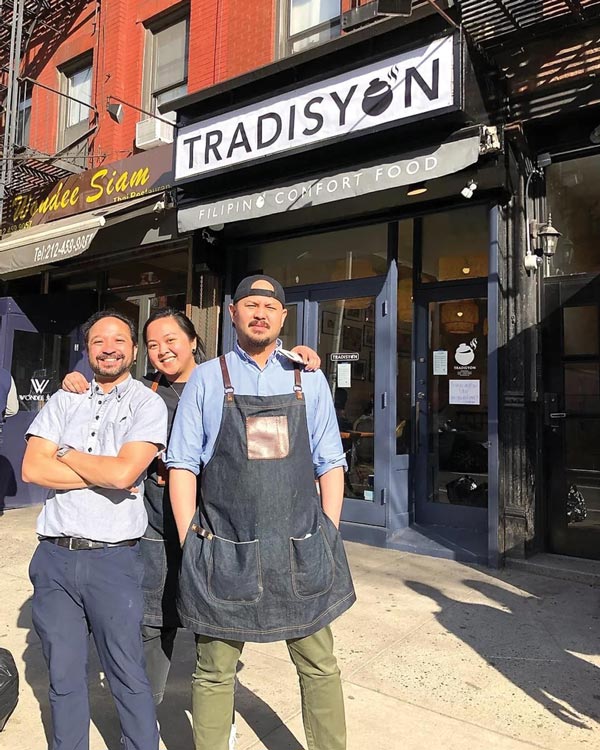
Rediscovering His Roots
“Crazily enough, we opened the week everything started to shut down in New York. We were unsure of how serious everything was as I’m sure many businesses were, but we were also hopeful it would all work out in the end,” Anton Dayrit shared.
Tradisyon’s story began in August last year when, Bianca Vicente, now their head chef, and Anton were in search one night of Filipino food delivery in Manhattan.
“We realized there were not a lot of options that could satisfy our cravings. Together with Joey Chanco, co-owner, who has experience in the hospitality industry, we knew we could fill in that void,” he added.
While he did not grow up eating Filipino food at home, even while living in the Philippines, Anton said he loved the Sisig from Trellis, Sizzling Bulalo Steak from Abuhan in Cebu, the Bibingka and Palabok from Via Mare and Halo-Halo from Razon.
“Tradisyon is my journey in re-discovering my roots and the flavors I loved — rich, bold and unapologetic,” he said.
As chef owner, Anton is responsible for creating the menu and leading the kitchen team, while Joey as co-owner manages the business side of the restaurant, which is located in the Hell’s Kitchen neighborhood in Manhattan.
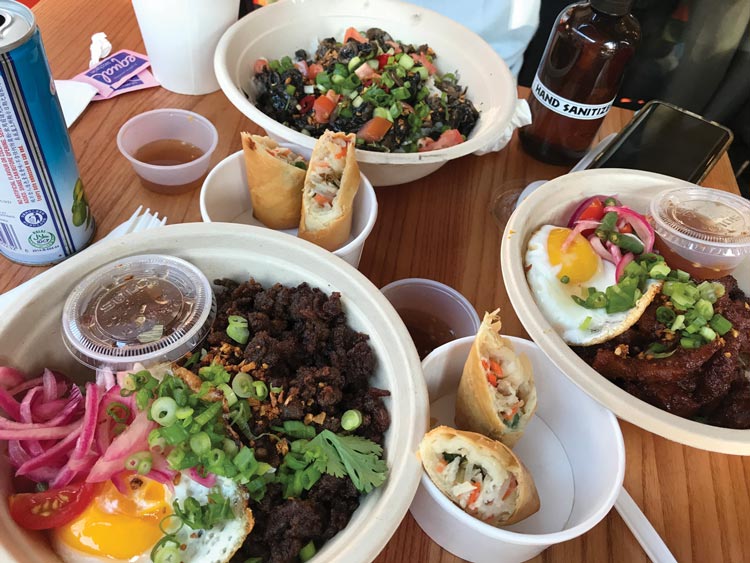
Tradisyon’s business model revolved around takeout and deliveries and this definitely worked to their advantage during the lockdown.
“The hardest part was the lack of foot traffic, residents in the area and neighboring business to rely on as potential customers. But through word of mouth, delivery apps that allowed discoverability, the start of outdoor dining and getting noticed by Eater, ABC7, food influencers and U.S.-Filipino media, our business started to pick up,” he shared.
When they were building the menu, Anton started off with the most popular and loved Filipino dishes that are known to both Filipinos and non-Filipinos. These include the classics: Pork Adobo, Sisig and Kare Kare.

The rest of the offerings were his personal favorites that offered a balance to the richness of the other dishes and could cater to different customers’ tastes who both know and are just discovering Filipino food.
They have also started to introduce more dishes like the jackfruit salad, Vigan longganisa and Anton’s current favorite, the Inihaw na Sugpo Ensalada (spicy grilled tiger prawns salad with bagoong vinaigrette).
“I think it’s a well-balanced dish. Plus the prawns we use from Butuan, Philippines are sweet and delicious,” he quipped.
With the changing seasons, they also plan to introduce more dishes that are more appropriate for the colder months.
“This journey started with my rediscovery of Filipino food,” Anton revealed. “This combined with the amazing feedback of our customers, patrons coming from all over New York, and customers who are trying Filipino food for the first time — these fuel my team. We want to continue serving them the best our birth country has to offer.”
Ultimately, the team hopes that Tradisyon is a means for Filipino food to become as in demand as Chinese and Thai food is now
There has been a surge of Filipino restaurants in New York as well as across the country that have been getting noticed and many are calling it the Filipino Food Wave, a phrase used by National Geographic in its feature about the cuisine.
“We hope Tradisyon is one of those restaurants that can continue to keep that momentum going,” he said. “On the business side, our ultimate dream is to grow Tradisyon to become a multi-location fast-casual restaurant across the U.S.”
Nurses turned entrepreneurs
We went to Bilao the first weekend that they opened and it felt like they were overwhelmed. Since the opening was Friday, they ran out of most of the dishes when they opened the following morning.
Located in the tony Upper East Side neighborhood of Manhattan (First Avenue and 75th Street), Bilao is near a few hospitals in the neighborhood.
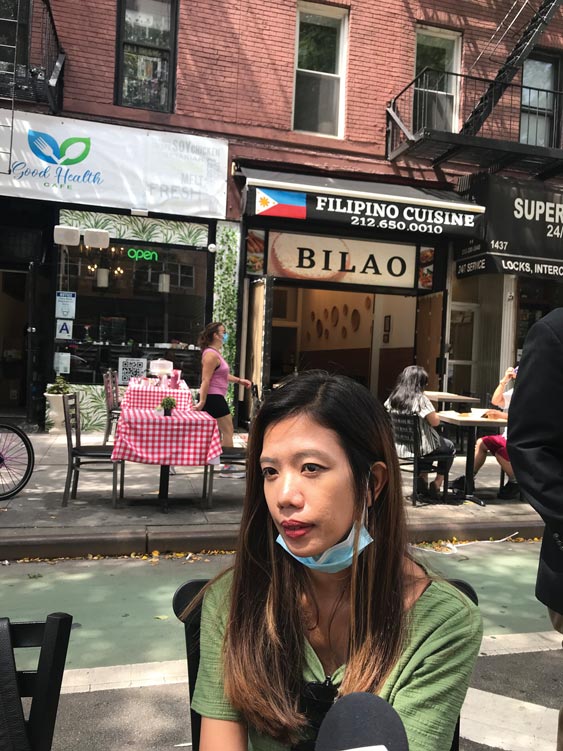
The owners are actually nurses who work the night shift and proceed to the restaurant once their shifts are over.
Marie Dinopol, Jude Canela and Joan Calanog are nurses at Mount Sinai Hospital and their story, similar to Tradisyon’s, began last year when they had a particular craving for Filipino food one evening but there were no Filipino restaurants in the vicinity. They had to go all the way downtown, or maybe Queens, to satiate such craving.
The pandemic happened, which somehow fast-tracked their project.
Last June, Gov. Andrew Cuomo announced that restaurants could reopen for outdoor dining and it was around this time that they saw what would become the location of their restaurant.
By the middle of August, they were ready to open.
Bilao has a thick menu, which includes the classic breakfast combo silogs offered all day, along with about 50 other dishes. This means a wide variety of options for first-time diners and for those who will opt to come back and try the other dishes.

The first-time restaurant owners are happy despite the roller coaster ride they have been experiencing since they opened because they have developed a steady clientele: the locals who live in the neighborhood and coworkers from Mount Sinai and fellow nurses from Lenox Hill, Weill Cornell and other medical centers on the Upper East Side’s hospital corridor.
“It was overwhelming. What we worried about (that there will be no customers because of the situation) was the total opposite. It was packed since Day 1,” Dinopol told the Asian Journal.
It turns out that their worries were unfounded. Some customers from Day 1 have been eating there every day until now.
“It feels really great especially the support of Filipinos in the neighborhood, but at the same time very, very pressured,” she added.
For now, it is the trio’s dream for Bilao to continue serving Filipino cuisine to the UES residents.
“And God willing, to expand in other boroughs. We would like to proudly advertise and share the delicious food our country has to other races, and of course, to serve our kababayans here in New York the food we used to have back home,” Dinopol said.
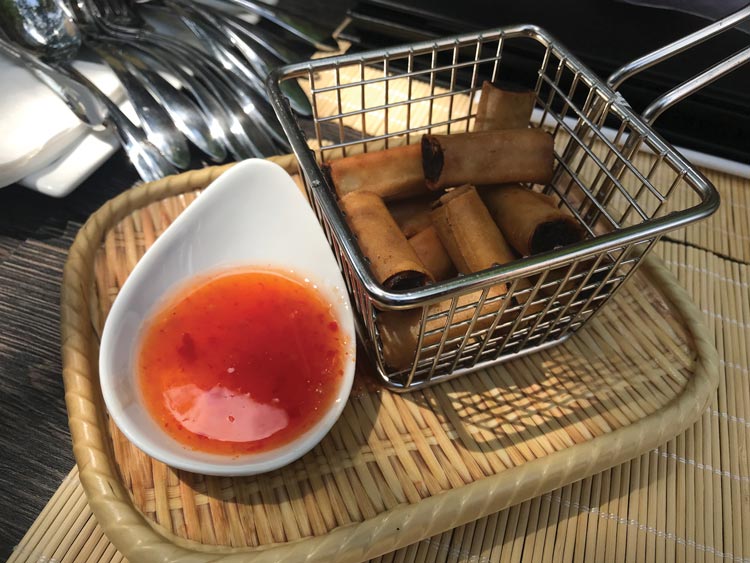
One of the reasons they opened the restaurant is because of the frontliners like them who work around the area.
“Theres’ a lot of hospitals around, and every hospital has a lot of frontliners, specifically Filipino nurses who work nights and days. Since most of the restaurants open at 11 a.m., we decided to open 8:00 a.m. to serve all the frontliners breakfast after their tiring and exhausting shift,” Dinopol remarked.
Dinopol is not a stranger when it comes to opening a business. The nurse from General Santos City also owns a dry cleaning business, which she has been operating on the same block for six years now.
“My experience on how to “open” a business helped me open my second. Running a business, whether a cleaners or restaurant, takes a lot of determination, strong will, unlimited patience and hard work to survive, most especially in this very expensive and competitive city,” Dinopol said.
Going regional
Like its neighbors along Westside, Jayhan’s Grill serves the classics but they also have hard to find dishes on the menu, courtesy of their Ilonggo chef.
The partners opened the restaurant in Jersey City on April 16, a month after the lockdown was announced. They focused on pick up and delivery and for five months, they did not have indoor dining.

Aki Flores vividly remembers one meal with the group at a restaurant with a great location but it wasn’t doing well. They felt bad for the owners and in a spirited discussion, each one shared what they believed would grow the business and the idea of them opening up their own began right there.
“Mahilig lang talaga kami kumain and naisip namin, what if mag open tayo ng restaurant na may street food, nami-miss yan lalo na yung mag lumaki sa Pilipinas na kumakain ng street food,” Flores, one of the owners told the Asian Journal.
They are also roommates, which for them, made the decision easier since everyone is already practically family for them. It just took a lot of courage on confidence on their part to jumpstart the dream.
“Pilipino tayo eh, malakas ang loob natin. During the pandemic pa, alam natin na nakakatakot pero kailangan lang na magtiwala sa sarili at sa mga kasama mo, and siyempre kay God,” Flores, a former health care worker said.
One of them, Jay Sia, took on the role of head chef. A native of Cadiz City, he has been working as a cook for 15 years and he is responsible for the Ilonggo flavor of some of their specialties. The restaurant is named after Jay and Hannah’s son Jayhan.
The restaurant is proud of their Ilonggo specialties: Bacolod style chicken inasal, pancit molo, kansi, KBL, and batchoy. The last three dishes are among the hardest to find since very few restaurants offer these regional delicacies.
“We’re a straight-up traditional Filipino restaurant and we offer specialties like cansi, which is like beef sinigang with bone marrow. Para din siyang bulalo na ginawang sinigang,” Flores quipped.
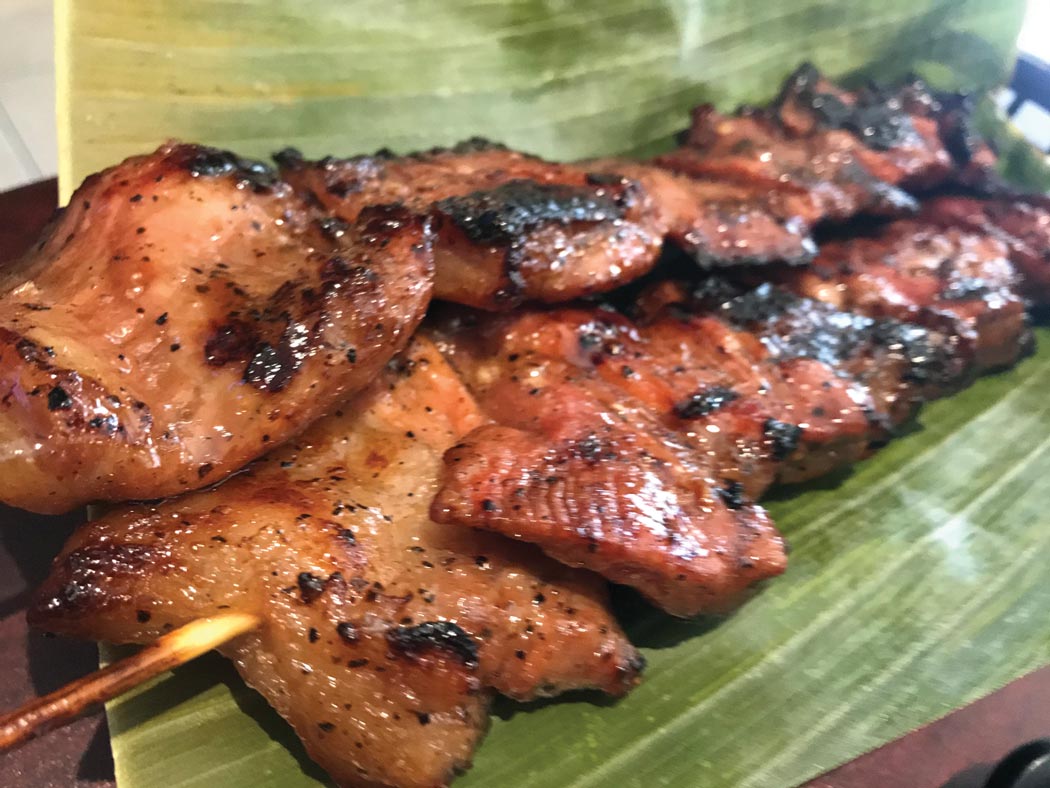
They have also introduced their binalot line, a full meal consisting of rice and a choice of viand. This is to cater to their clients who prefer quick and easy transactions since there is no wait time and the food is ready anytime.
Tesa Abaya Austria, an accountant by profession, acts as the group’s adviser and handles the administrative side of the business.
“It was a leap of faith. Hindi tayo puwedeng magpatalo sa pandemic, para na rin ito sa kanila, para makaungos na,” she said, explaining the decision to open in April. “And more importantly, trust and confidence in each other. Tiwala na kakayanin namin ito.”
These business owners all opened their restaurants in an unstable economy and under the crushing challenges of this global pandemic, armed with the positive Filipino spirit and strong work ethic. They remain optimistic that things are eventually going to be fine.






